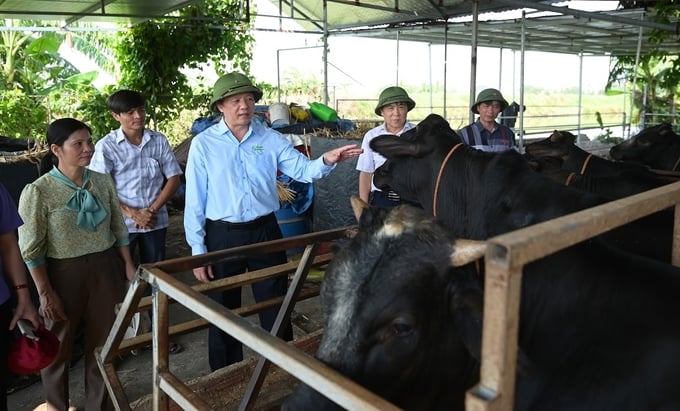November 28, 2025 | 06:08 GMT +7
November 28, 2025 | 06:08 GMT +7
Hotline: 0913.378.918
November 28, 2025 | 06:08 GMT +7
Hotline: 0913.378.918

Director of Bac Giang Agricultural Extension Center Dao Xuan Vinh inspects and evaluates the actual models affected by Typhoon No. 3. Photo: Tung Dinh.
A few days after the flood receded, technical training classes in the style of in-field conferences were organized by the Bac Giang Agricultural Extension Center in key livestock farming areas of the province.
Dao Xuan Vinh, Director of the Bac Giang Provincial Agricultural Extension Center, said that support activities for people were implemented before, during and after Typhoon No. 3 made landfall. Accordingly, the agricultural extension system coordinated with the district-level People's Committees and cooperatives in each area to establish Zalo groups, then continuously updated storm information, provided technical guidance and disseminated response and recovery procedures for the damage caused by the storms.
“Due to the storm, it is difficult for people to move around, but the need for information cannot be stopped,” said Vinh. Apart from the Zalo channel, agricultural extension officers in particular and the agricultural sector in general also answer people's questions through the fanpage and website of Bac Giang Department of Agriculture and Rural Development.
Embracing the mentality of "wherever the floodwaters recede, we disinfect and repopulate livestock", agricultural extension officers in Bac Giang have proactively added some practical content related to overcoming the consequences of storms and floods when training local farmers, such as livestock health management, disinfection, environmental sanitation, and nutritional supplements.
Directly teaching a class on fattening cattle at the cultural house of Ngoc Son village (Yen Dung district) on September 20, Nguyen Thi Gam, an officer of the Agricultural Extension of Livestock and Fisheries Office, saw that people are very interested in finding and buying quality breeds with clear origins and fully vaccinated due to the impact of floods and storms, in addition to the technical needs.
Livestock farmers are now actively raising pigs and chickens to sell before, during and after Tet. However, through preliminary assessments, the food supply in Bac Giang province has not been affected much.
“The company has closely coordinated with the National Agricultural Extension Center to grasp the actual demands of localities. We also have a plan to allocate and produce breeds in a timely manner, serving the needs of reconstruction after floods,” said Nguyen Ngoc Kien, Deputy General Director of Hanoi Livestock Breeding Joint Stock Company.

Bac Giang residents focus on restocking right after Typhoon No. 3. Photo: Tung Dinh.
According to Kien, the unit can quickly create a source of breeding stock of poultry and waterfowl within 1 - 2 months. In the case of large livestock groups such as buffalo, cows, or monotocous animals, the breeding time would be fairly long. “Along with the support of the Central Government, localities also need to secure an early reconstruction plan. Our company is committed to transferring breeds quickly and promptly, focusing on breeds with high economic efficiency for people specifically those in the northern mountainous region”.
Nguyen Thi Nhung (My An commune) is one of the people in need. Her house area was heavily flooded. During Typhoon No. 3, her family proactively moved 200 pigs to the highlands. Last weekend, the pigs were moved to the barn to be cared for, ensuring the right time to sell them in the last months of the year.
Although some barns are flooded and had their roofs blown off, Nhung still boldly re-herds. In order to ensure the health of her pigs, she strengthens disease prevention and resistance increase measures. For example, she normally sprays disinfectants every 15 days, but now she shortens the interval to 7 - 10 days and changes the vaccines regularly to avoid the situation where the virus gains antiviral resistance.
Translated by Samuel Pham

(VAN) On November 27, in the meeting with Minister Tran Duc Thang, Mayor Yin Yong shared Beijing’s experience to improve environment and air quality.

(VAN) After 30 years, both sides identified strategic areas of cooperation: sustainable production, increasing coffee value and training for farmers.
/2025/11/27/4910-4-164708_294.jpg)
(VAN) On the afternoon of November 27 in Beijing, Minister of Agriculture and Environment Tran Duc Thang held a working session with several major Chinese enterprises operating in the agriculture and environment sector.

(VAN) The Department of Animal Health issued a provisional guideline requesting local authorities to increase surveillance, collect samples for testing, and conduct epidemiological investigations according to the established procedure.

(VAN) The United Nations recommends that Vietnam utilize data and artificial intelligence to enhance early disaster warnings and reduce GDP losses by 3.2% in the context of climate change.

(VAN) On the morning of November 27 in Beijing, Minister Tran Duc Thang and the Deputy Commissioner General of the General Administration of Customs of China signed a protocol on fresh jackfruit exports.

(VAN) As floodwaters recede, a vast network of irrigation works across eastern Gia Lai is emerging in a state of severe disrepair, with extensive damage demanding urgent restoration ahead of the 2025-2026 winter-spring cropping season.